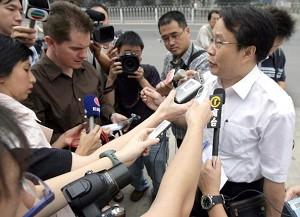BEIJING—China has charged outspoken human rights lawyer Gao Zhisheng with inciting subversion, his lawyer said on Thursday, extending a government campaign to curb activists challenging its authority.
Gao was arrested on Sept. 21 “on suspicion of inciting subversion of state power”, lawyer Mo Shaoping said, adding that he had only now learned of the decision from prosecutors.
“In fact, it should be the public security bureau that notifies us. But I asked them repeatedly and got no reply, and only then went to the prosecutors,” Mo told Reuters.
Gao, in his early 40s, is a famously combative rights lawyer who has taken up the causes of dispossessed oil investors, labour activists and—most controversially—practitioners of Falun Gong, an outlawed spiritual movement.
His arrest marked another step in the ruling Chinese Communist Party’s campaign to stifle an expanding nationwide “rights defence” network seeking to expand citizens’ rights through courts and publicity campaigns, said activists.
“Right now, the government’s number one enemy is the rights defence movement, and Gao Zhisheng has been one of its leading figures,” Hu Jia, a Beijing-based dissident who knows Gao, told Reuters.
Gao was detained by Beijing police in August, one of several prominent rights lawyers and activists who have been jailed, detained or put under house arrest in past months.
Earlier this year, Gao organised a rolling hunger-strike to protest police harassment of political activists.
He also helped campaign to seek the release of Chen Guangcheng, a blind activist sentenced to more than four years jail in August on charges that critics said were trumped up by angry local officials.
Mo said he was not told of the specific accusations against Gao. Under Chinese law, those convicted of inciting subversion can be jailed for up to five years—longer in serious cases.
The crime has often been directed at dissidents who publish criticisms of the government in print or on the Internet. Gao had issued a public letter criticising the Chinese government’s crackdown on Falun Gong.
China’s top security official, Luo Gan, warned in June that the “rights defence” movement harboured forces dedicated to overturning the Communist Party.
Gao’s arrest is likely to inflame international criticisms of Beijing’s curbs on human rights.
On Oct. 2, dozens of prominent human rights advocates and scholars of China based in the United States, Europe and Australia issued a petition urging China to end its crackdown on Gao and other activists.
“We urge the immediate releases of those still held, the dismissal of all charges, and the immediate restoration of Mr. Gao’s license to practice to law,” they wrote. “All Mr. Gao’s activities were peaceful and legal.”





